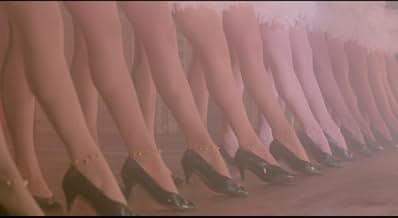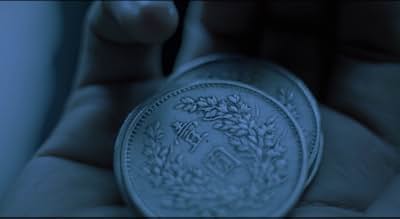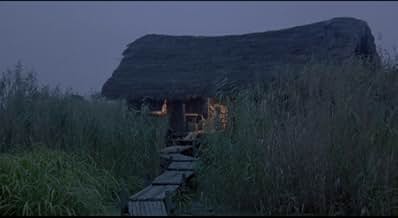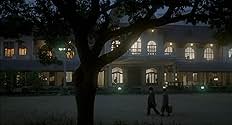IMDb रेटिंग
7.1/10
6.3 हज़ार
आपकी रेटिंग
अपनी भाषा में प्लॉट जोड़ेंA provincial boy related to a Shanghai crime family is recruited by his uncle into cosmopolitan Shanghai in the 1930s to be a servant to a ganglord's mistress.A provincial boy related to a Shanghai crime family is recruited by his uncle into cosmopolitan Shanghai in the 1930s to be a servant to a ganglord's mistress.A provincial boy related to a Shanghai crime family is recruited by his uncle into cosmopolitan Shanghai in the 1930s to be a servant to a ganglord's mistress.
- 1 ऑस्कर के लिए नामांकित
- 5 जीत और कुल 4 नामांकन
फ़ीचर्ड समीक्षाएं
This film is, foremost, a gangster film, but Zhang Yimou tells it from a much more interesting angle. As far as the plot about moles and trying to find the traitor in the group, it's old hat. What isn't, however, is seeing how the children, practically enslaved by a triad boss, begin to slowly turn into the type of people that Tang and Bijou are throughout the movie.
Another refreshing change was, despite Tang's wealth, the triads are not romanticized like the mafia often is in this country. Tang, unlike Vito Corleone, is a ruthless killer, born and bred, not a family man forced into a situation.
What impresses me most about Zhang Yimou's films are the cyclic nature, where everything comes full circle in the end. For many, the colors and political messages are the topic of discussion, but watching events carry out within a restricted time, and follow the Eastern idea of cyclical rather than linear time, is more interesting, since these characters continue to develop in one's head even after the movie has ended.
Another refreshing change was, despite Tang's wealth, the triads are not romanticized like the mafia often is in this country. Tang, unlike Vito Corleone, is a ruthless killer, born and bred, not a family man forced into a situation.
What impresses me most about Zhang Yimou's films are the cyclic nature, where everything comes full circle in the end. For many, the colors and political messages are the topic of discussion, but watching events carry out within a restricted time, and follow the Eastern idea of cyclical rather than linear time, is more interesting, since these characters continue to develop in one's head even after the movie has ended.
Here's something you don't see every day - a mobster movie that focuses on the evil of criminals, instead of their coolness. "Shanghai Triad" shows you how mob violence destroys the life of a gangster's moll and endangers her innocent, fresh-from-the-country servant. It's exactly the kind of story you wouldn't see in a Hollywood movie - which is, I suppose, why we watch this weird foreign stuff!
Gong Li is, as ever, forceful and compelling, with a role that's infinitely more interesting than what America's "lead" actresses usually get. She's very glamorous here, and totally unlike the peasant characters she played in "To Live" and several other films. What a wonderful, versatile actress.
The film's other strengths include gorgeous, award-winning cinematography, interesting point-of-view shots, and an effective shift from an urban to a country setting that's pulled off very smoothly. It's a shame that this is the last film that director Zhang Yimou and Gong Li made together, but at least it caps off their collaboration on a high note.
Gong Li is, as ever, forceful and compelling, with a role that's infinitely more interesting than what America's "lead" actresses usually get. She's very glamorous here, and totally unlike the peasant characters she played in "To Live" and several other films. What a wonderful, versatile actress.
The film's other strengths include gorgeous, award-winning cinematography, interesting point-of-view shots, and an effective shift from an urban to a country setting that's pulled off very smoothly. It's a shame that this is the last film that director Zhang Yimou and Gong Li made together, but at least it caps off their collaboration on a high note.
When I first saw Zhang Yimou's wonderful 'Raise the Red Lantern', I missed all but the last 30 minutes. This is the most regretful episode of my life for the film has now been deleted. My life was honestly changed as that half an hour was a real time anomoly, obeying the theory of relativity and breaking that particular convention by immersing me so fully that it seemed to last forever and yet, not long enough. 'Shanghai Triad' does not contain that one off quality, however, it is in itself a fascinating film. The colour scheme, of many Yimou films remains, his use of colour is deeply moving as it becomes sublime and almost 'old school'. You can see movies of the studio system being played out again but in a whole new style. Red is so prominent once again and for reasons we can only speculate. Personally I see the colour red as an exciting colour, it conveys to me a sense of a past in which I did not belong to, how I did not exist. The fascination I have in history pre-1982 and more importantly the early 20th century glamour and ancient history.
The splendour of the whole thing is beyond belief, it could almost have the production values of a Hollywood mainstream movie. It shows that perhaps you can create a better effect with lower production values. The Tang household is splendid, but it's vastness perfectly encapsulates a lonely feeling that puts you in the place of the child as well as any cliched point of view shots ever could. It is moments like these that prove Yimou's background as a cinematographer, he is a master of the visual, able to simply show a character's mood in an implicit sweep of camera and minutely fine detail within the mise-en-scene excluding cliche from his work completely. This is the sort of filmmaking we would associate with Ridley Scott, Scott is a visualist, he works with far darker tones than Yimou, which from a personal point of view, makes Yimou my prefered choice, but Scott himself blended both dark and light in 'Thelma and Louise' like Yimou has done for most of his career. The characters themselves have layers of light and dark which are conveyed well in all of their surroundings.
This comparison with Scott brings me to the point in Triad when the empathy shifts from the boy to be shared by him and Bijou. This does echo a bit of the Roy Batty syndrome which was probably the reason for 'Blade Runner's' limited success on it's original release, or so says Robert McKee. But Gong Li's performance is outstanding. She nails Bijou's nasty streak to a tee and then compels us to believe that she is more than that. Of course it is helped when the viewer feels that the situation she is in is a frightening one, not unlike mountaineering where one false step could end up in death, at what ever height you are at. Li is one of the finest actresses in the world, not to mention that her beauty is unparalleled. (Despite the fact that she is just four years younger than my mother) The film may not be seen as very moral but it is clear that it has heart as we feel so bad about the events that end the film. Li shows her hardness of character and complete vulnerability then finally her loss of control, shame and regret. This heart is not made of solid stone, rather a quite flexible rubber.
It requires a period of reflection, one that does not equal that of 'Raise the Red Lantern' but is the only film to have such a numbing effect since. By now though, I have Lantern in such a high regard that it borders on gaining a mythical quality as I have yet to see it in it's entirety. It's not every day that a heavily opinionated young man will be reduced to a pathetic single syllable, but when Triad is finished, many of you will be reduced to it too, lay back and just clear your head of anything other than the film, all that enters the head will be "Wow".
The splendour of the whole thing is beyond belief, it could almost have the production values of a Hollywood mainstream movie. It shows that perhaps you can create a better effect with lower production values. The Tang household is splendid, but it's vastness perfectly encapsulates a lonely feeling that puts you in the place of the child as well as any cliched point of view shots ever could. It is moments like these that prove Yimou's background as a cinematographer, he is a master of the visual, able to simply show a character's mood in an implicit sweep of camera and minutely fine detail within the mise-en-scene excluding cliche from his work completely. This is the sort of filmmaking we would associate with Ridley Scott, Scott is a visualist, he works with far darker tones than Yimou, which from a personal point of view, makes Yimou my prefered choice, but Scott himself blended both dark and light in 'Thelma and Louise' like Yimou has done for most of his career. The characters themselves have layers of light and dark which are conveyed well in all of their surroundings.
This comparison with Scott brings me to the point in Triad when the empathy shifts from the boy to be shared by him and Bijou. This does echo a bit of the Roy Batty syndrome which was probably the reason for 'Blade Runner's' limited success on it's original release, or so says Robert McKee. But Gong Li's performance is outstanding. She nails Bijou's nasty streak to a tee and then compels us to believe that she is more than that. Of course it is helped when the viewer feels that the situation she is in is a frightening one, not unlike mountaineering where one false step could end up in death, at what ever height you are at. Li is one of the finest actresses in the world, not to mention that her beauty is unparalleled. (Despite the fact that she is just four years younger than my mother) The film may not be seen as very moral but it is clear that it has heart as we feel so bad about the events that end the film. Li shows her hardness of character and complete vulnerability then finally her loss of control, shame and regret. This heart is not made of solid stone, rather a quite flexible rubber.
It requires a period of reflection, one that does not equal that of 'Raise the Red Lantern' but is the only film to have such a numbing effect since. By now though, I have Lantern in such a high regard that it borders on gaining a mythical quality as I have yet to see it in it's entirety. It's not every day that a heavily opinionated young man will be reduced to a pathetic single syllable, but when Triad is finished, many of you will be reduced to it too, lay back and just clear your head of anything other than the film, all that enters the head will be "Wow".
This is a fine movie - wonderfully acted, beautifully shot, quite simple. Without being heavy-handed, one comes to sense the presence of real evil that tempts and corrupts and destroys. It's a little slow at times because the story is so simple - yet the slowness and simplicity does allow the messages of the movie to hit home. Something else I like is that the protagonist boy is not made to be cute or winning - he just is who he is - largely an observer but sometimes acting with generosity and sometimes with contempt.
Much has been said by others about the beautiful cinematography and that's certainly true - but I'm also struck by the amazing work of those who constructed or chose the sets, costumes, background characters - they were quite memorable. What a star in Gong Li, and what a director!
I don't agree with those who contrast this with American movies - surely we feel the same evil in watching either version of Scarface or The Petrified Forest or The Road to Perdition.
In fact, I would say this movie is most like The Road to Perdition of any I've seen - not in its story particularly but in its tone, its simplicity, its contrasts of character, its cinematography.
This is also a good movie for those who say they don't like foreign movies - you'll like this one.
Much has been said by others about the beautiful cinematography and that's certainly true - but I'm also struck by the amazing work of those who constructed or chose the sets, costumes, background characters - they were quite memorable. What a star in Gong Li, and what a director!
I don't agree with those who contrast this with American movies - surely we feel the same evil in watching either version of Scarface or The Petrified Forest or The Road to Perdition.
In fact, I would say this movie is most like The Road to Perdition of any I've seen - not in its story particularly but in its tone, its simplicity, its contrasts of character, its cinematography.
This is also a good movie for those who say they don't like foreign movies - you'll like this one.
There has been way to much chatter about how beautiful this film is with its sumptuous sets, costumes, and magnificent photography. On the surface this looks like another gangster film, this time taking place in Shanghai. But of course, it isn't. The gangster scenario is just the backdrop really.
Shuisheng, a boy of 14, has come to the city to serve the haughty and beautiful Xiao Jingbao, the nightclub singing moll of Tang, head of the most powerful gang in Shanghai.
Shuisheng's uncle is a riot as he gives the boy a whacky set of instructions on how to be a proper servant to snobby Xiao, wonderfully played by Gong Li. "Call her 'Miss'. Follow her wherever she goes, not to far behind, and not to close. That's the rule. Hold her coat in your left hand and her hat in the right, but don't let the coat drag on the floor. That's the rule. Got it?" And the Shuisheng replies, "Got it." However, after "Miss" delights in calling him a country bumpkin, and chews him out a couple of times, (And why not, Shuisheng can't tell a red dress from a green one.) the kid starts looking for the exit. When his uncle tells him, "When she rings for you, stop everything (yes, everything) and go to her. Got it?" His reply this time is, "I want to leave." Bad move, uncle is most displeased.
In many ways, Shuisheng is the most inscrutable character in the movie. He's got a real poker face, and you'll probably have a tough time deciding if he's an idiot, or a sharp kid who's observing things closely and learning fast. This is the heart of the film, the relationship between the boy and the woman. Eventually, the boy will find out the self-important, hip swinging Xiao Jingbao is miserable. She is the beautiful songbird hopelessly trapped in a world where she is bathed in luxury by the ruthless Tang, with no hope of freedom.
The boy's whole attitude changes when he realizes this, and the question the film poses from here is ... what, if anything, can he do about it? If this was an American film, (and I'd love to see such a version) probably plenty, but director Yimou Zhang is a cynical man with a dark outlook on life. All his films have downbeat endings, and this one is no exception. What really bothers me though, is that events take place that result in a complete shift in setting half way through the film, and that's always a dangerous move in the cinema. And this abrupt shift comes at a time when things are just getting interesting in the nightclub, when Shuisheng realizes "Miss" is very unhappy. He might have been able to help her in the big city and spacious confines of the nightclub, but marooned on an island, there's not much he can do. This is a good film, but I would have liked to see the plot move in a different direction in the second half.
Shuisheng, a boy of 14, has come to the city to serve the haughty and beautiful Xiao Jingbao, the nightclub singing moll of Tang, head of the most powerful gang in Shanghai.
Shuisheng's uncle is a riot as he gives the boy a whacky set of instructions on how to be a proper servant to snobby Xiao, wonderfully played by Gong Li. "Call her 'Miss'. Follow her wherever she goes, not to far behind, and not to close. That's the rule. Hold her coat in your left hand and her hat in the right, but don't let the coat drag on the floor. That's the rule. Got it?" And the Shuisheng replies, "Got it." However, after "Miss" delights in calling him a country bumpkin, and chews him out a couple of times, (And why not, Shuisheng can't tell a red dress from a green one.) the kid starts looking for the exit. When his uncle tells him, "When she rings for you, stop everything (yes, everything) and go to her. Got it?" His reply this time is, "I want to leave." Bad move, uncle is most displeased.
In many ways, Shuisheng is the most inscrutable character in the movie. He's got a real poker face, and you'll probably have a tough time deciding if he's an idiot, or a sharp kid who's observing things closely and learning fast. This is the heart of the film, the relationship between the boy and the woman. Eventually, the boy will find out the self-important, hip swinging Xiao Jingbao is miserable. She is the beautiful songbird hopelessly trapped in a world where she is bathed in luxury by the ruthless Tang, with no hope of freedom.
The boy's whole attitude changes when he realizes this, and the question the film poses from here is ... what, if anything, can he do about it? If this was an American film, (and I'd love to see such a version) probably plenty, but director Yimou Zhang is a cynical man with a dark outlook on life. All his films have downbeat endings, and this one is no exception. What really bothers me though, is that events take place that result in a complete shift in setting half way through the film, and that's always a dangerous move in the cinema. And this abrupt shift comes at a time when things are just getting interesting in the nightclub, when Shuisheng realizes "Miss" is very unhappy. He might have been able to help her in the big city and spacious confines of the nightclub, but marooned on an island, there's not much he can do. This is a good film, but I would have liked to see the plot move in a different direction in the second half.
क्या आपको पता है
- ट्रिवियाThis was a difficult film for Yimou Zhang to make. His relationship with his leading lady Gong Li was coming to an acrimonious end and the Chinese authorities were deliberately hassling him with complicated and elusive work permits. That was mainly because they were still annoyed with him for submitting his previous film Huo zhe (1994) to the Cannes Film Festival without their permission.
- भाव
Xiao Jingbao: [to Song] Just because you fucked me you think you're the boss?
- कनेक्शनFeatured in 53rd Annual Golden Globe Awards (1996)
टॉप पसंद
रेटिंग देने के लिए साइन-इन करें और वैयक्तिकृत सुझावों के लिए वॉचलिस्ट करें
- How long is Shanghai Triad?Alexa द्वारा संचालित
विवरण
बॉक्स ऑफ़िस
- US और कनाडा में सकल
- $20,86,101
- US और कनाडा में पहले सप्ताह में कुल कमाई
- $2,09,098
- 25 दिस॰ 1995
- दुनिया भर में सकल
- $20,86,101
इस पेज में योगदान दें
किसी बदलाव का सुझाव दें या अनुपलब्ध कॉन्टेंट जोड़ें

















